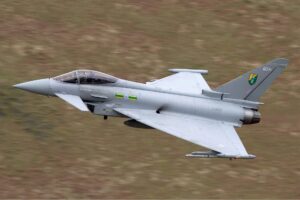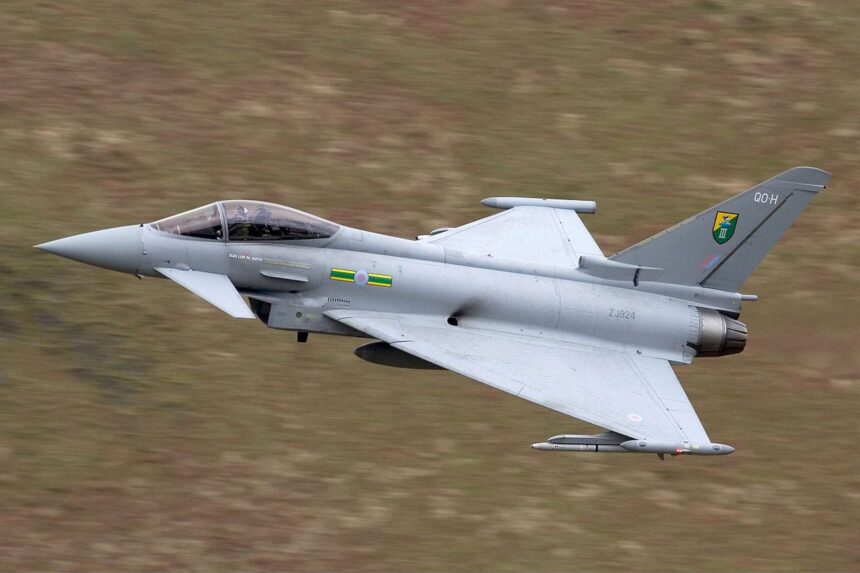
In a significant move that could reshape the balance of air power in the region, Turkey has announced plans to purchase up to 40 EF-2000 Typhoon fighter jets from the United Kingdom, with the possibility of acquiring 40 more. This development marks a potential shift in Turkey’s military procurement strategy and could have far-reaching implications for its defense capabilities, international relations, and the global arms market. The Eurofighter Typhoon, a state-of-the-art multirole combat aircraft, represents a considerable upgrade to Turkey’s current air force inventory. This blog post will delve into the details of this proposed deal, explore the capabilities of the Typhoon, and analyze the potential impact on Turkey’s military standing and its relationships with NATO allies and regional powers.
Turkey’s interest in the Eurofighter Typhoon represents a significant investment in its air force capabilities. The proposed deal is structured as follows:
- Initial Order: Turkey plans to purchase 20 EF-2000 Typhoon fighter jets.
- Option for Additional Units: There is a provision for an additional 20 aircraft, bringing the potential first phase to 40 jets.
- Future Expansion: If the Turkish Air Force is satisfied with the performance of the Typhoons, there is a possibility of ordering 40 more units.
This phased approach allows Turkey to evaluate the aircraft’s performance and integration into its forces before committing to a larger fleet. The total potential acquisition of 80 Typhoons would represent a major boost to Turkey’s air combat capabilities and a significant contract for the UK’s defense industry.
The Eurofighter Typhoon: A Technological Marvel
The EF-2000 Typhoon is a highly advanced, multirole combat aircraft that has proven its capabilities in various air forces around the world. Some key features of the Typhoon include:
- Advanced Avionics: State-of-the-art radar and sensor systems for superior situational awareness.
- High Maneuverability: Exceptional agility in air-to-air combat scenarios.
- Multirole Capabilities: Effective in both air-to-air and air-to-ground missions.
- Supersonic Cruise: Ability to supercruise at Mach 1.5 without afterburners.
- Modern Weapons Systems: Compatible with a wide range of advanced missiles and smart bombs.
The acquisition of Typhoons would significantly enhance Turkey’s ability to project air power and defend its airspace. It would also provide Turkey with a platform capable of integrating with NATO’s advanced combat networks.
Strategic Implications for Turkey and the Region
Turkey’s move to acquire Eurofighter Typhoons could have several strategic implications:
- NATO Interoperability: The Typhoon’s widespread use among NATO members could enhance Turkey’s ability to participate in joint operations and exercises.
- Regional Balance of Power: The acquisition could alter the military balance in the Eastern Mediterranean and Middle East, potentially affecting relations with neighbors like Greece and regional powers like Russia.
- Defense Industry Cooperation: This deal could open doors for increased cooperation between Turkey and UK defense industries, possibly leading to technology transfers and joint development projects.
- Diversification of Military Suppliers: By turning to the UK for fighter jets, Turkey demonstrates a willingness to diversify its defense procurement beyond traditional sources like the United States and Russia.
- Economic Considerations: Such a large defense contract could have significant economic implications, both for Turkey’s budget and for its relationship with the UK.
The decision to pursue Typhoons may also be seen in the context of Turkey’s complex relationships with other arms suppliers, including its exclusion from the F-35 program and tensions with the United States.
Challenges and Considerations
While the potential acquisition of Eurofighter Typhoons presents numerous advantages, there are also challenges and considerations to be addressed:
- Integration Costs: Incorporating a new fighter type into Turkey’s air force will require significant investments in training, maintenance infrastructure, and logistics.
- Political Hurdles: The deal may face scrutiny from other NATO allies and could be subject to political negotiations given Turkey’s sometimes contentious foreign policy positions.
- Compatibility with Existing Systems: Turkey will need to ensure that the Typhoons can be effectively integrated with its current air defense and command systems.
- Long-term Support: Securing a long-term maintenance and upgrade agreement will be crucial for sustaining the Typhoon fleet over its operational lifetime.
- Potential for Domestic Production: Turkey may seek to negotiate terms for partial domestic production or assembly, aligning with its goals of developing its indigenous defense industry.
Turkey’s potential acquisition of Eurofighter Typhoons represents a significant step in modernizing its air force and could reshape regional military dynamics. As this deal progresses, it will be crucial to monitor its impact on Turkey’s strategic posture, its relationships within NATO, and its role in regional security. We encourage readers to stay informed about developments in defense procurement and their geopolitical implications. Share your thoughts on how this deal might affect international relations and regional stability in the comments below, and join the conversation on the future of air power in the 21st century.










